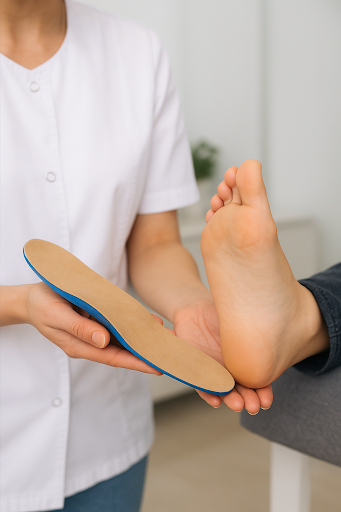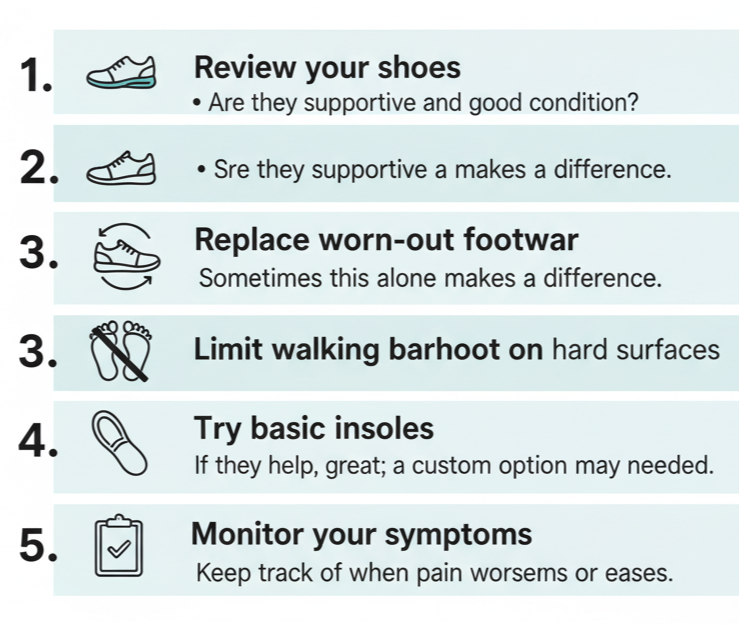Do You Really Need Orthotics? Here’s How to Know
Understanding Orthotics
Orthotics are specialised inserts or devices placed inside your shoes to support and improve the way your feet move. They can help reduce pain, improve comfort, and prevent strain on the feet, ankles, knees, and even the lower back. But the big question many people ask is: Do I really need them?
However, not everyone needs orthotics. For some people, improving footwear alone is enough—while others may benefit from custom-made orthotics to provide longer-term support. The key is understanding your symptoms, foot structure, and daily activity level.
What Orthotics Can Do
Orthotics are custom-engineered shoe inserts designed to correct foot mechanics, redistribute pressure, and prevent injury. In a city like Sydney, where 1 in 3 adults report foot pain from long commutes, standing jobs, or weekend hikes in the Blue Mountains, orthotics can be a game-changer.
“Sydney stat: Over 68% of office workers in the CBD experience heel or arch pain after prolonged standing — orthotics reduce this by up to 41% when properly prescribed.”
They’re not just cushioned insoles — they’re medical devices that:
Support flat feet, high arches, or collapsed arches
Reduce heel pain (plantar fasciitis) and shin splints
Correct pronation/supination to protect knees, hips & lower back
Prevent diabetic ulcers and nerve damage
Improve balance & performance for runners and tradies
Signs You Might Benefit from Orthotics
Not every ache in the foot means you need orthotics, but here are some clear signs that a professional assessment is worthwhile:
Heel pain that feels sharp in the morning or after rest.
Aching arches or tired feet after standing or walking.
Flat feet or very high arches that cause imbalance.
Shoes wearing down unevenly on one side.
Frequent ankle rolling or instability.
Pain spreading to knees, hips, or lower back that seems linked to how you walk.
Ongoing discomfort after a foot or ankle injury.
Foot issues related to diabetes or nerve conditions.
If any of these sound familiar, orthotics may provide relief and prevent the problem from getting worse.
The Different Types of Orthotics
There isn’t a one-size-fits-all solution. Orthotics vary in design and purpose:
Over-the-counter orthotics – Pre-made insoles that can help with mild symptoms.
Semi-custom orthotics – Partially tailored supports that give more targeted relief.
Custom orthotics – Specifically moulded to your feet, ideal for ongoing or complex problems.
Orthotics can also be soft and cushioning for comfort, or firm and corrective to guide movement. The right type depends on your condition, footwear, and daily activities.
Self-Check Before Considering Orthotics
Before rushing to buy inserts, try this simple process:
Review your shoes – Are they supportive and in good condition?
Replace worn-out footwear – Sometimes this alone makes a difference.
Limit walking barefoot on hard surfaces – This can add strain.
Try basic insoles – If they help, great; if not, a custom option may be needed.
Monitor your symptoms – Keep track of when pain worsens or eases.
If pain persists, or if you have medical conditions affecting your feet, it’s time to see a podiatrist.
What to Expect With Orthotics
If you’re prescribed orthotics, the process usually involves:
A detailed assessment of your feet and walking pattern.
Custom impressions or digital scans to design your devices.
A gradual wearing-in period so your body adjusts.
Follow-up checks to make sure they’re working correctly.
Guidance on care, cleaning, and replacement when worn out.
Final Thoughts
Orthotics can make a noticeable difference in reducing pain and improving comfort — but they’re not necessary for everyone. Some people feel relief simply by choosing better footwear, while others benefit most from custom orthotics designed specifically for their feet.
If you're unsure whether orthotics could help you, the team at Podhills Podiatry in Sydney can assess your foot structure, walking pattern, and symptoms to recommend the most suitable treatment option for your lifestyle.
Ready to find out what your feet really need?
Book an assessment today and take the first step toward comfortable, pain-free movement.
FAQs
-
If you have ongoing foot, heel, knee, or lower back pain that worsens with activity, uneven shoe wear, flat feet, or high arches, an assessment by a podiatrist can help determine whether orthotics could help you.
-
Over-the-counter orthotics may provide short-term comfort, but custom orthotics are specifically moulded to your feet and are more effective for long-term support, pain relief, and correcting movement issues.
-
Most custom orthotics last between 1–3 years, depending on how often they’re worn, your activity level, and footwear. Regular check-ups help ensure they continue to work effectively.
-
Yes. If your pain is caused by poor foot alignment or walking mechanics, orthotics can help redistribute pressure and improve movement patterns, reducing strain higher up the body.


